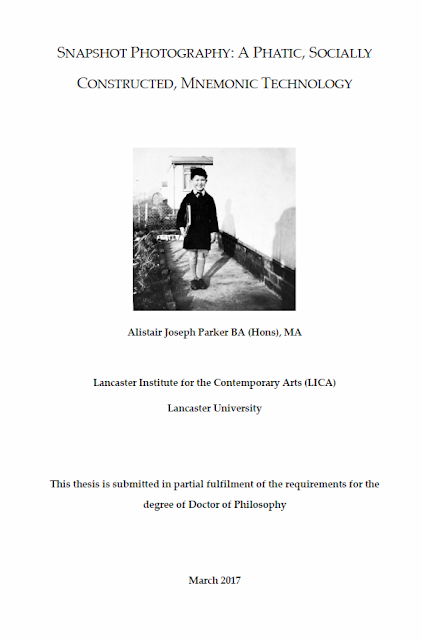Abstract
This practice related research study explores my cognitive response to a biographical snapshot photograph celebrating my first day at school. The experience triggered an exploration of the relationship between snapshot photographs and memory. The finding of a second almost identical snapshot photograph of my son taken twenty years later by me prompted me to question why my father and I should take almost identical snapshots.
I argue that the invention of photography was driven by the desire to capture the images created by the camera obscura by mark-making with the pencil of light as an aid memoir.
I argue that the desire to externalise memory using mnemonic technology is innate with primal origins in parietal art and lithic technologies. The discourse explores the cultural evolution of technology through Jaques Derrida’s theory of originary technicity and Bernard Stiegler’s concept of the cultural evolution of technology by epiphylogenesis and the notion of the externalisation of memory as prosthesis.
I explore the emergence of snapshot photography from the canon of photography through the theories of cultural evolution, technological momentum, and social constructivism, together with psycho-social notions of desire, ritual, performativity and intentionality in the establishment of snapshot photography as a ubiquitous ingrained social practice.
The research is informed by a studio practice element that uses the adventures of Lewis Carroll’s, Alice as a conceptual framework to explore a journey of agency, self and auto didactical knowledge acquisition. I discuss the search for an appropriate methodological framework for art practice based research.
My practice is a catalyst for enquiry; a project usually starts with an artefact that forms the locus of a question, the search for the answer to those questions, often leading epistemically, to unexpected places and relationships. The mode and manner of my enquiry are rhizomatous, pragmatic and serendipitous; the relationship between practice and theory is flexible, one informing the other.
Through practice, I explore the deconstruction and textualisation of the visual metaphor of memory through the rhetorical devices of ekphrasis and memory texts and a visualisation of the nature and originary technicity of snapshot photography and an exploration of self and place.
The thesis for this study is founded on the premise that snapshot photography is a socially constructed, phatic, mnemonic mark-making technology with origins in parietal forms of visual expression.
Thesis Download Links
UPDATE: 23 August 2020
The former link to my Thesis is no longer available, here are alternative links to the completed Thesis and the Powerpoint Presentation of the exhibition that was part of my practice related research
Link the Lancaster University Research Directory page http://www.research.lancs.ac.uk/portal/en/publications/snapshot-photography(82923ac2-44bd-4800-9be3-191d9f63f802).html
Link to the PhD Thesis PDF document file
http://www.research.lancs.ac.uk/portal/services/downloadRegister/201945481/Parker2017phd.pdf
Link to the Powerpoint Presentation of the accompanying Exhibition
http://www.research.lancs.ac.uk/portal/services/downloadRegister/201945483/PhD_Exhibition_Presentation.pptx
